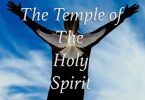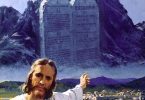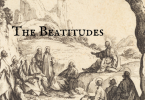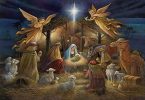
Theme: Their eyes were opened.
Scripture Readings: Acts 2:14,22-33; Ps. 15:1-2. 5-7-11; 1 Pet. 1:17-21; Lk. 24:13-35
St. Luke is one of the best writers of the New Testament. His Greek language was very good because he was brought in the Hellenistic culture. It is obvious to assume that St Luke made the right choice of words in his Gospel. Todays’ Easter story is unique to the Gospel of Luke. Although a vague reference is given to the story in the Gospel of Mark (16:12-13), St. Luke tells us at the beginning of the story that the disciples were restrained by God himself from recognizing Jesus (Lk. 24:16). But when the appointed time came their eyes were opened (Lk. 24:31); it happened at the specific moment of breaking of bread. There is something that is very interesting in this story that Luke wants us to know; St. Leo the Great makes a careful examination of this phrase “their eyes were opened” (δε διηνοιχθησαν οι οφθαλμοι) thus revealing to us that the usage of this phrase is found nowhere in the Bible except at only one place (Sermon 73). The full line occurs in the same way and in the same very wording as it is found in the gospel of Luke in the third chapter of the book of Genesis. It is a dramatic event in the book of Genesis. Adam and Eve sinned when they violated the command of God. They ate the fruit of the tree of knowledge, thus causing sin to enter into them and into the world. After this everything changed and turned upside down. The scriptures say that their eyes were opened (Gen. 3:7).
The event in the lives of Adam and Eve changed the whole history of humanity. They realized for the first time that they were naked. It means to say that humanity stopped seeing from the eyes of God and they began to see the world with the eyes of the world. They were naked from the creation, they had no problem but now they had a problem so they chose to hide. Man lost the ability to converse with God which was given to human beings at the time of creation. He could not see him anymore because Man began to see his benefits. He started fighting to achieve it even at the cost of blood. He focused on materialism. The effects of our first parents’ sin entered into man’s vision of reality, and it continued till the time of Jesus.
During that time, God was trying to repair the damage. He sent patriarchs, judges, prophets and kings. At last, He chose His Son to heal the wounded-sinful world. He wanted to open the eyes of man. God reversed what happened at the time of creation (Book of Genesis). He sent Jesus, the New Adam into the world. He allowed His son/New Adam to be hanged on the ‘tree of knowledge’ that is the Cross. He also made Him the fruit of salvation. Those who eat his flesh and drink His blood (fruit of the Eucharist) will be saved. At this moment, He opened the eyes of His disciples to see the Risen Lord. It means to say that man received the original sight which he had lost at the time of our first parents’ fall. The story of Emmaus is indeed a manifestation of this major reversal of vision.
St. Paul who had lost his vision on the way to Damascus, regained his vision once he received faith in Jesus Christ. He also believed that God has reserved the vision by raising Jesus to life. He tells us in his letter to Romans, “For as by one man’s disobedience many were made sinners, so also by one man’s obedience many will be made righteous.” (Rom. 5:19).
The disciples were the first witnesses of the Risen Lord. The scriptures say these two disciples were sad and they considered Jesus as just a prophet. They were unable to recognize the Risen Lord. They thought He was a fellow traveler. They had the reports of empty tomb yet they were walking without hope. This is a state of mind that shows the old humanity which is burdened, weighed down, focused on the materialism. However, at the breaking of the bread, their eyes were opened. They had eaten the food of life. They saw the Risen Lord. Their lives were changed. They became men of a new vision. They felt the burning of heart, in other words, the joy of the Risen Lord. They felt that they should share the good news, new vision with others. Although they were tired and the day was setting, they chose to return to Jerusalem at the same hour. The lives of disciples were changed with the opening of eyes.
The passion, death and resurrection of Jesus help to open of our eyes which was focused on materialism. We have now been given a new vision by God in Jesus Christ. Jesus opened the minds of his disciples at the breaking of Word while he was on the way and at the breaking of the bread at the table. These two become an integral part of the Sacrament of Eucharist.
Jesus comes to us even today in our ordinary circumstances at the Eucharistic banquet. He wants to open our eyes to see the beautiful things that God has kept for us. Are we ready to involve him in our lives? Are we ready to share with him our difficulties? Are we ready to listen to him? Are we ready to accommodate him in our lives? Are we ready to dine with him? If we do so then we are bound to experience the Glory of God for which we long. Amen.
Fr. Alex D’Mello






